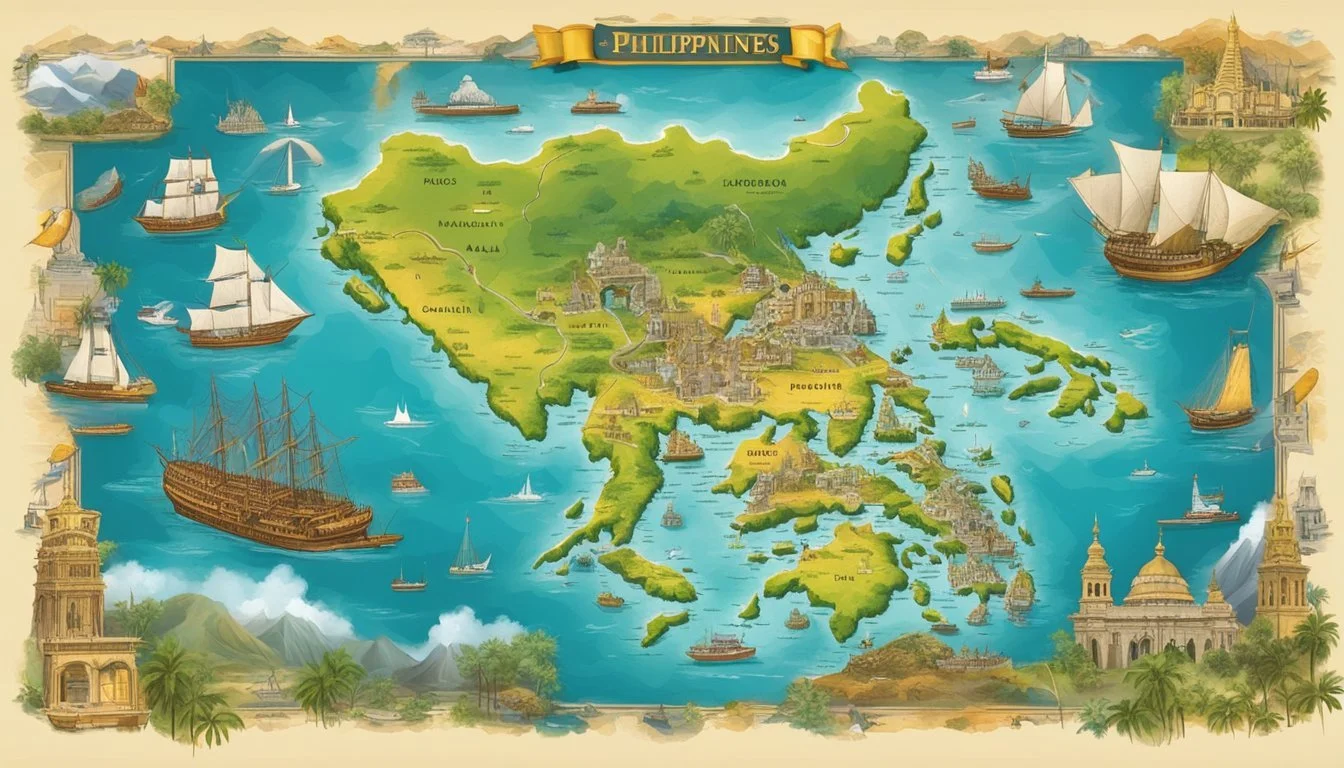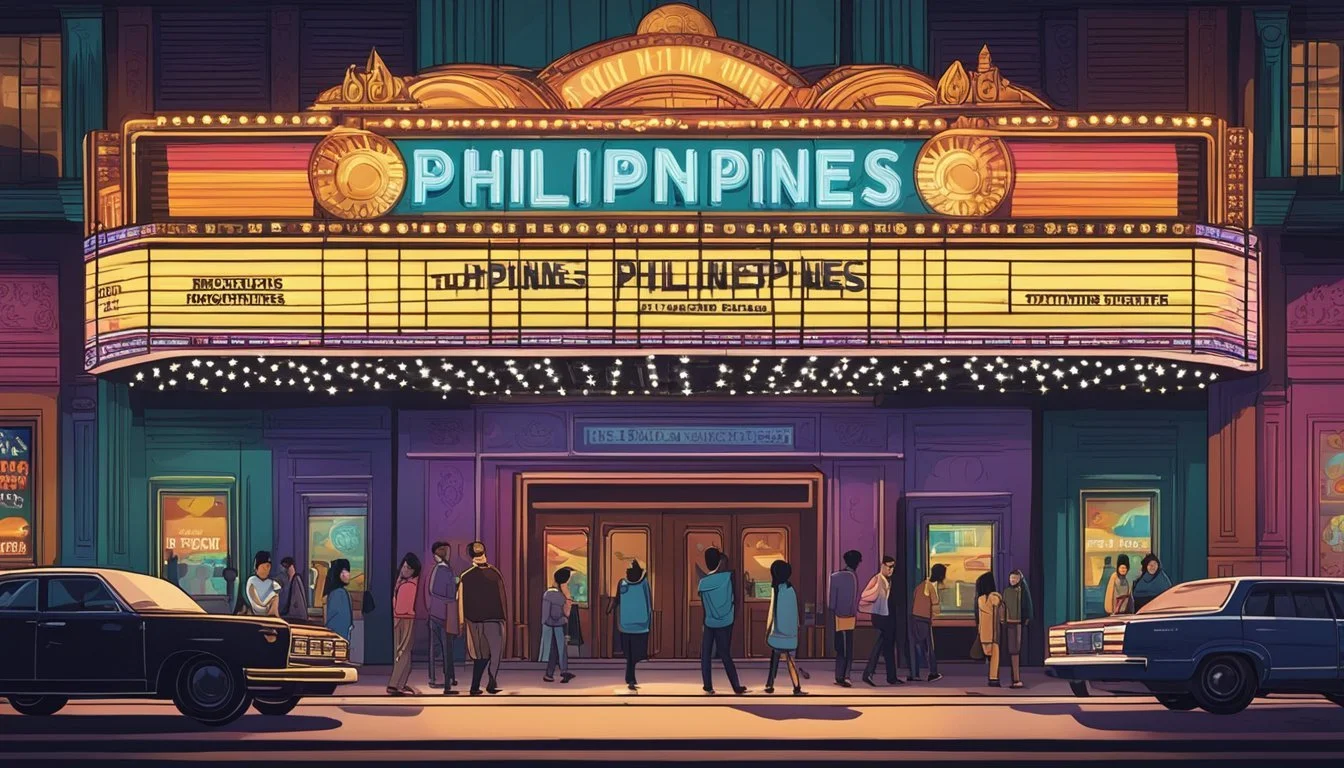10 Revealing Documentaries About the Philippines
Unveiling Hidden Truths and Cultural Gems
Documentaries offer a powerful lens through which to explore and understand a country's culture, history, and society. The Philippines, with its rich tapestry of traditions, diverse landscapes, and complex past, provides fertile ground for filmmakers seeking to capture compelling stories.
These 10 revealing documentaries about the Philippines shed light on various aspects of the nation, from its natural wonders to its social challenges and historical events. Each film presents a unique perspective, allowing viewers to gain deeper insights into the Filipino experience and the forces that have shaped this archipelagic country in Southeast Asia.
1) "The Kingmaker" by Lauren Greenfield
"The Kingmaker" offers a revealing look at Imelda Marcos, the former First Lady of the Philippines. Directed by Lauren Greenfield, this documentary explores Marcos's attempts to rehabilitate her family's image and influence Filipino politics.
Greenfield's film provides unprecedented access to Imelda Marcos herself. It captures candid moments and shocking admissions from the controversial figure, including complaints about her sequestered assets.
The documentary initially set out to potentially tell a redemption story. However, it evolved into a more investigative piece as Greenfield delved deeper into the Marcos family's history and ongoing political maneuvers.
"The Kingmaker" examines Imelda Marcos's lavish lifestyle and her efforts to rewrite historical narratives. It showcases her son Bongbong's political aspirations and the family's broader impact on Philippine democracy.
Critics praised Greenfield's approach in revealing Imelda Marcos's psyche and delusions of grandeur. The film serves as both a character study and a warning about the dangers of political dynasties and historical revisionism.
2) "Imelda" directed by Ramona Diaz
Ramona Diaz's 2003 documentary "Imelda" offers an intimate look at the life of Imelda Marcos, former First Lady of the Philippines. The film traces her journey from beauty queen to powerful political figure.
Diaz's documentary covers Imelda's marriage to Ferdinand Marcos, their rule during the dictatorship era, and her eventual exile in Hawaii. It also explores her return to the Philippines and subsequent legal battles.
"Imelda" gained recognition at the Sundance Film Festival, earning praise for its revealing portrayal of the controversial figure. The documentary allows Marcos to tell her own story, providing a unique perspective on her life and experiences.
Viewers can expect to see footage from Imelda's days as a beauty queen, her time as First Lady, and her later years facing court battles. The film offers insights into her mindset and motivations throughout these different periods.
"Imelda" is available to stream online for free, making it accessible to audiences interested in Philippine history and politics. It serves as a valuable resource for those seeking to understand the complex legacy of the Marcos regime.
3) "Give Up Tomorrow" directed by Michael Collins
"Give Up Tomorrow" is a powerful documentary that exposes flaws in the Philippine justice system. It follows the case of Paco Larrañaga, who was sentenced to death for a crime he maintains he did not commit in 1998.
The film, directed by Michael Collins, sheds light on corruption and injustice within the legal process. It examines the circumstances surrounding Larrañaga's conviction and the impact on his life and family.
Collins' work garnered significant acclaim, winning awards at prestigious film festivals. It received the Audience Award and a Special Jury Prize for New Director at the Tribeca Film Festival.
The documentary provides a critical look at the use of the death penalty in the Philippines. It raises questions about the reliability of evidence and witness testimonies in criminal cases.
Through Larrañaga's story, the film offers a broader commentary on societal issues in the Philippines. It challenges viewers to consider the human cost of flaws in the criminal justice system.
4) "Bound" by Alex Camilleri
"Bound" is a documentary film directed by Alex Camilleri that offers a poignant look into the lives of Maltese fishermen. While not specifically about the Philippines, this film provides valuable insights into maritime cultures and traditions that resonate with island nations like the Philippines.
The documentary focuses on the struggles and resilience of Jesmark, a Maltese fisherman facing economic hardships. It explores themes of tradition, modernity, and the challenges of sustaining traditional livelihoods in a changing world.
Camilleri's film captures the raw beauty of the Mediterranean Sea and the intimate details of daily life for fishing communities. The cinematography showcases the stark realities of small-scale fishing operations and the bonds formed between fishermen and their environment.
"Bound" sheds light on issues such as overfishing, economic pressures, and the impact of globalization on local industries. These themes are highly relevant to the Philippines, where fishing plays a crucial role in the economy and culture of many coastal communities.
The film's authentic portrayal of maritime life and its challenges provides a compelling narrative that can foster understanding and empathy for similar communities worldwide, including those in the Philippines.
5) "Batas Militar" directed by Jon Red
"Batas Militar" is a powerful 1997 Filipino documentary that explores the tumultuous period of martial law under Ferdinand Marcos. Directed by Jon Red and Jeannette Ifurung, the film offers a comprehensive look at this critical chapter in Philippine history.
The documentary examines the extensive human rights violations and economic turmoil that characterized Marcos' martial rule. It combines dramatizations with factual narration to create a compelling narrative of the era.
Red and Ifurung's work delves into the events leading up to the declaration of martial law and its lasting impact on Philippine society. The film also covers the growing opposition movement and the eventual People Power Revolution that ousted Marcos.
"Batas Militar" features narration by Joonee Gamboa, adding gravitas to its presentation of historical events. The documentary serves as an important educational tool, preserving the memory of a significant period in Philippine history.
By presenting a detailed account of martial law, "Batas Militar" contributes to the ongoing dialogue about democracy and human rights in the Philippines. It stands as a testament to the importance of remembering and learning from the past.
6) "Himala Ngayon" directed by Sari Raissa Lluch Dalena
"Himala Ngayon" is a 2012 documentary that explores the making and legacy of the 1982 Filipino drama "Himala." Directed by Sari Raissa Lluch Dalena and Keith Sicat, the film delves into one of the most celebrated works in Asian cinema.
The documentary features interviews with key figures involved in the original film, including director Ishmael Bernal and lead actress Nora Aunor. It provides insights into the production process and the cultural impact of "Himala" on Filipino society.
"Himala Ngayon" addresses longstanding questions about the film, such as the theory behind "Who killed Elsa?" It offers a retrospective look at the masterpiece nearly three decades after its initial release.
The documentary has been made accessible to a wider audience through online platforms. It was streamed on Cinema One's YouTube channel, allowing viewers to revisit this important piece of Philippine cinema history.
Through its examination of "Himala," the documentary sheds light on the film's enduring significance in Asian cinema. It serves as both a tribute to the original work and an exploration of its lasting influence on Filipino culture.
7) "Call Her Ganda" directed by PJ Raval
"Call Her Ganda" is a powerful documentary that explores the brutal murder of Jennifer Laude, a Filipino transgender woman, by a U.S. Marine in 2014. The film follows the legal battle and political uprising that ensued after her death.
PJ Raval's documentary sheds light on the complex intersections of gender, justice, and U.S.-Philippines relations. It focuses on three women intimately connected to the case: Jennifer's mother, a transgender journalist, and an activist attorney.
The film serves as both a courtroom drama and a broader examination of U.S. imperialism in the Philippines. It highlights the challenges faced in pursuing justice for Laude's murder, revealing deep-rooted political biases.
"Call Her Ganda" not only tells Jennifer's personal story but also captures the wider societal impact of her death. It showcases how the tragedy galvanized a political movement seeking justice and challenging historical power dynamics.
Through its narrative, the documentary provides insight into transgender rights, military agreements between nations, and the lasting effects of colonialism. It offers a nuanced portrayal of a complex issue that resonates beyond the Philippines.
8) "The Delano Manongs" by Marissa Aroy
"The Delano Manongs" is a documentary that sheds light on the often overlooked contributions of Filipino farmworkers to the American labor movement. Directed by Marissa Aroy, the film focuses on the 1965 Delano Grape Strike and the formation of the United Farm Workers Union.
The documentary highlights Larry Itliong, a key organizer who led Filipino workers in the Agricultural Workers Organizing Committee. It explores how these workers initiated the grape strike, which later merged with Cesar Chavez's efforts to create the UFW.
Aroy's film uses archival footage and interviews with the Manongs (a term of respect for older Filipino men) and their families. This approach provides a personal perspective on the struggles and achievements of these farmworkers.
By uncovering this lesser-known chapter of labor history, "The Delano Manongs" offers a more complete picture of the farm workers' movement. The documentary has received critical acclaim for its powerful storytelling and historical significance.
9) "Resettlement to Redress" directed by Han Wang
"Resettlement to Redress" is a compelling documentary that explores the experiences of Japanese Americans after their release from internment camps during World War II. Directed by Han Wang, the film sheds light on a crucial period in Asian American history.
The documentary chronicles the challenges faced by Japanese Americans as they attempted to rebuild their lives and reintegrate into society. It examines the lasting impact of internment on individuals, families, and communities.
Wang's film incorporates archival footage and interviews with survivors and their descendants. These personal accounts provide intimate insights into the resilience and determination of those affected by internment.
The documentary also explores the redress movement, which sought official recognition and compensation for the injustices suffered by Japanese Americans. It highlights the long struggle for acknowledgment and the eventual passage of the Civil Liberties Act of 1988.
"Resettlement to Redress" offers a nuanced look at a complex chapter in American history. Wang's directorial approach presents the facts objectively while allowing the voices of those impacted to shine through.
10) "Aswang" by Alyx Ayn Arumpac
"Aswang" is a powerful documentary directed by Alyx Ayn Arumpac that sheds light on the Philippines' war on drugs under President Rodrigo Duterte's administration. The film takes its name from Filipino folklore, where aswang refers to shape-shifting monsters that prey on humans at night.
Arumpac's documentary follows individuals whose lives intersect with the escalating violence in the Philippines. It provides a raw, unflinching look at the human rights crisis that has affected tens of thousands of lives since Duterte's election in 2016.
The film earned critical acclaim, winning the International Critic's Prize and the Amnesty International Award at the Thessaloniki Documentary Festival. It offers viewers a stark portrayal of the consequences of Duterte's anti-drug campaign.
"Aswang" intertwines personal stories with broader societal issues, creating a haunting narrative that reflects the fear and uncertainty permeating Philippine society. The documentary serves as both a record of recent history and a call for awareness about the ongoing situation in the country.
Cultural Insights Through Documentary
Documentaries offer a unique window into Philippine culture, traditions, and history. They capture authentic experiences and provide nuanced perspectives on the complex tapestry of Filipino society.
Understanding Philippine Traditions
Philippine documentaries showcase the rich tapestry of cultural practices across the archipelago. Films explore rituals like the Subanen people's buklog ceremony in Zamboanga Peninsula. This elaborate event, recognized by UNESCO as Intangible Cultural Heritage, reflects deep-rooted spiritual beliefs and community bonds.
Other documentaries highlight diverse traditions:
Oral storytelling
Traditional performing arts
Unique social customs
These films preserve vanishing practices and educate viewers on the significance of cultural heritage. By documenting intangible elements, they ensure future generations can connect with their roots.
Impact of Colonial History
Documentaries examining Philippine colonial history reveal its lasting influence on society. Films often explore:
Spanish cultural imprints (300+ years of rule)
American governance effects (1898-1946)
Japanese occupation period (1942-1945)
These works analyze how foreign rule shaped:
Language
Religion
Education systems
Political structures
By presenting historical footage and expert interviews, documentaries offer critical insights into the complex identity of modern Philippines. They encourage viewers to reflect on the nation's past and its role in shaping contemporary Filipino culture.
Social Issues and Movements
Philippine documentaries explore pressing societal challenges and grassroots efforts for change. These films shed light on economic disparities, human rights concerns, and environmental threats facing the nation.
Documentaries on Poverty and Inequality
"Give Up Tomorrow" examines corruption and injustice in the Philippine legal system. The film follows a high-profile murder case, exposing flaws in the justice process and broader human rights issues.
"The Kingmaker" offers a critical look at political dynasties and wealth inequality. It focuses on Imelda Marcos and her family's impact on Philippine society and governance.
"Human" features personal stories from Filipinos living in poverty. The documentary highlights daily struggles and resilience in impoverished communities across the country.
Environmental Challenges
"Patrimonio" chronicles a coastal community's fight against a large resort development. The film showcases grassroots environmental activism and the clash between economic interests and local ecosystems.
"Losing Alamagan" documents the effects of climate change on small Philippine islands. It captures the challenges faced by island communities as rising sea levels threaten their homes and livelihoods.
"Plastics in Paradise" explores marine pollution in Philippine waters. The documentary follows efforts to clean up beaches and reduce plastic waste in coastal areas.
Philippine Cinema and Storytelling
Philippine cinema has a rich history of documentary filmmaking that captures the country's diverse culture and societal issues. Talented directors have pushed the boundaries of storytelling through innovative techniques and compelling narratives.
Evolution of Documentary Filmmaking
Documentary filmmaking in the Philippines began in the early 20th century, primarily as a tool for government propaganda. Over time, it evolved into a powerful medium for social commentary and cultural preservation. In the 1970s and 1980s, filmmakers started exploring more experimental approaches, blending fiction and non-fiction elements.
The digital revolution in the 2000s democratized filmmaking, allowing more diverse voices to emerge. This led to an increase in intimate, personal documentaries that tackled previously taboo subjects. Modern Philippine documentaries often focus on environmental issues, indigenous rights, and the effects of globalization on local communities.
Influential Filipino Directors
Kidlat Tahimik, known as the "Father of Philippine Independent Cinema," pioneered essay films that critiqued colonialism and globalization. His work blends autobiography, fiction, and documentary techniques to create unique cinematic experiences.
Ditsi Carolino has gained international recognition for her socially conscious documentaries. Her films often highlight marginalized communities and human rights issues in the Philippines. Carolino's work demonstrates a keen eye for intimate, personal stories that reflect larger societal problems.
Nick Deocampo's contributions to LGBT cinema and historical documentaries have been groundbreaking. His films explore Philippine history and culture through innovative narrative structures and visual techniques. Deocampo's work has inspired a new generation of Filipino filmmakers to push creative boundaries.







